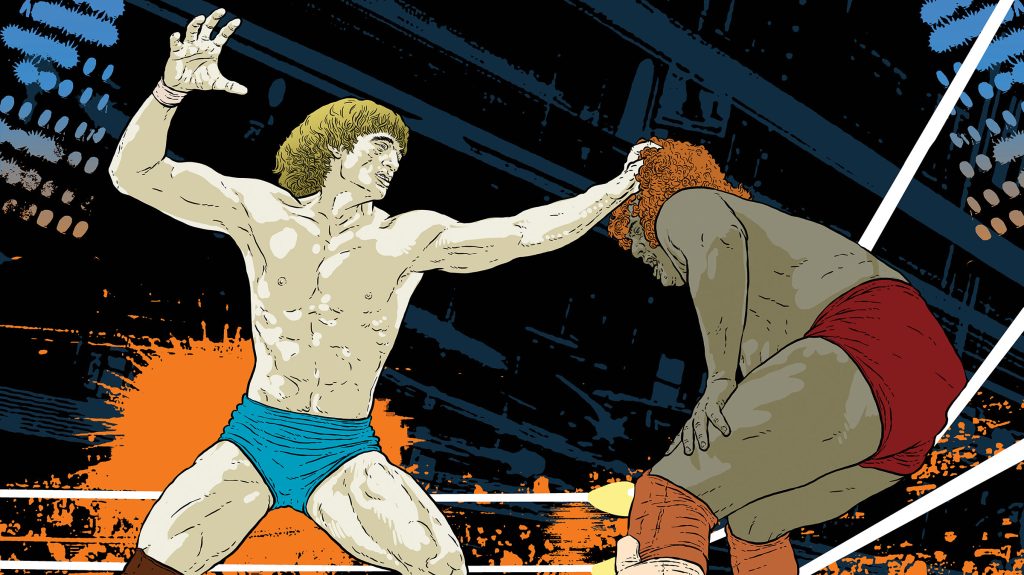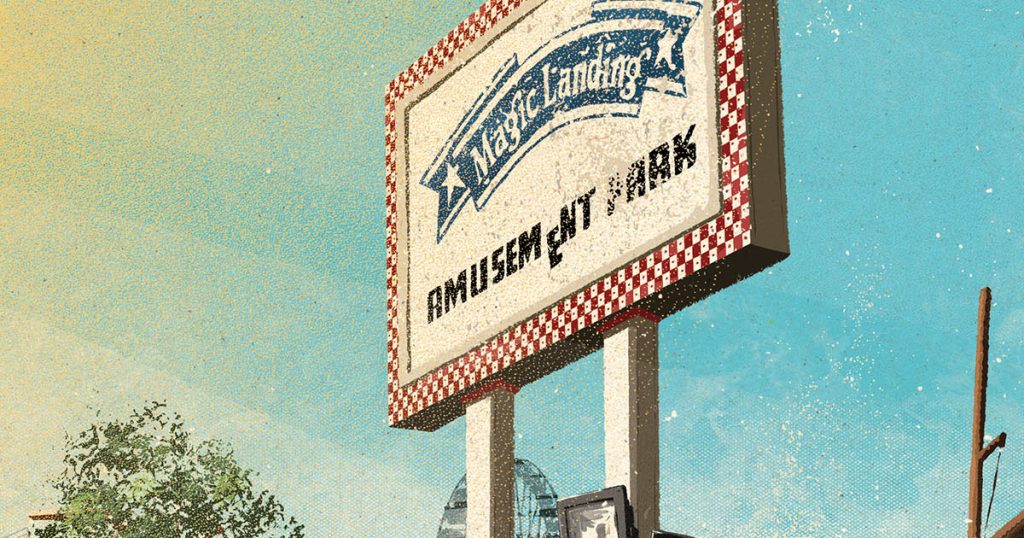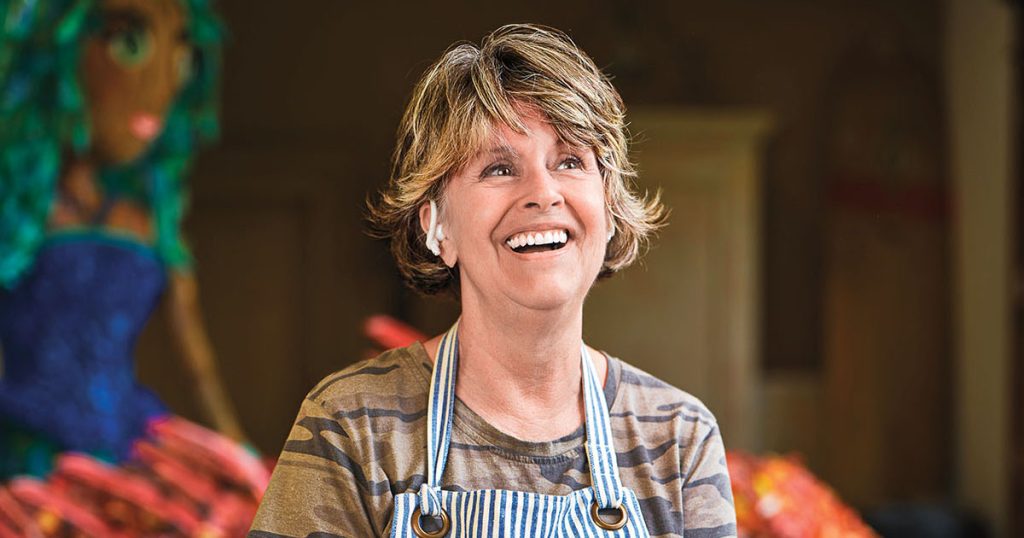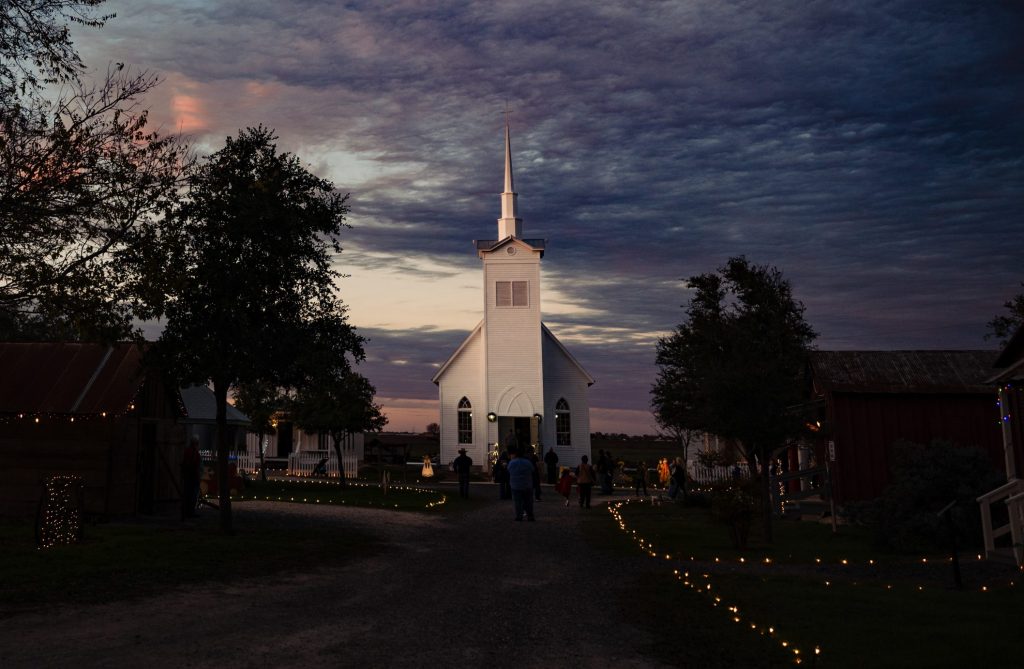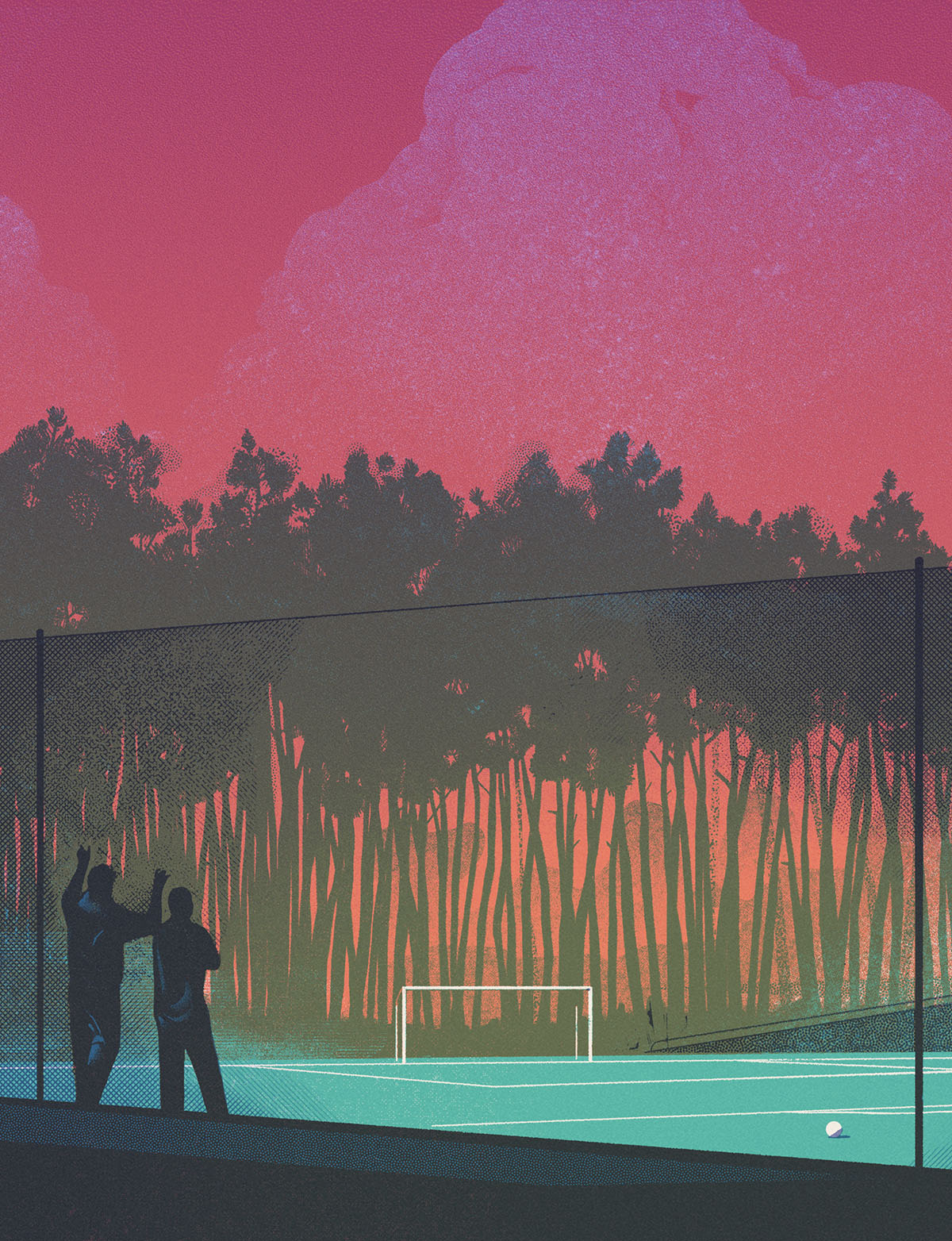
Illustration by Juan Bernabeu
The Infinite Worlds
of Yesterday
A son and his parents return to the fields of their dreams
by Antonio Ruiz-Camacho
For a decade, my wife, Valentina, and I traveled every weekend to see our younger son, Guillermo, play soccer in Houston, Dallas, College Station, or San Antonio, where he defended the goal as a keeper since he was a boy. During that same time, my older son, Emiliano, taught himself how to make ’80s-inspired dance music and recorded his first songs amid walls plastered with graffiti and posters of Michael Jackson and Lady Gaga in the bedroom that now acts as my writing studio. Today the weekend road trips are scarce, and there’s a blank and quiet that floods our home.
Both kids have left Austin, where my family and I have lived since 2004, to chase their athletic and musical dreams in Madrid and New York, respectively—faraway places where they probably belonged even before they departed in the fall of 2021. Our house feels improbably massive, eerily uninhabited. But it felt puny in the before years, when the boys still lived with us, large and indomitable in their 6-foot-4 and 6-foot-5 bodies. The rooms and hallways would burst with the chaos of scattered size 13 sneakers and muddied cleats and smelly goalkeeper gloves, the cacophony of disco paraphernalia cluttering bookshelves and India ink for homemade tattoos staining bathroom sinks. Our unpretentious house was built in the early ’80s in a corner of northwest Austin that was affordable and old-fashioned, like the neighborhood on The Golden Girls, when we moved in. But now it is peppered with flipped, sleek, black-and-white McMansions. When the boys lived here, this place could barely contain all their loud, rebellious Gen Z energy.
This is a story I can only tell from the blurry nostalgia of a father perched on his dusty empty nest. It begins with early weekend trips along Interstate 35 and US 290 West and ends with difficult farewells by the TSA PreCheck line at Austin-Bergstrom International Airport.
Guillermo now lives in Europe, where he plays fútbol full time. He was 9 when the whole family traveled out of town for one of his soccer tournaments for the first time. The year was 2013. It must have been around Labor Day weekend because The Woodlands, where the tournament took place, felt as sultry and otherworldly as the Amazon. I had been to Houston many times for my work as a journalist, but never to that lush suburb 45 minutes north. I was impressed by the carefully manicured urban planning that was obsessed with concealing every chain store, post office, apartment complex, and gas station from view behind a never-ending wash of towering pine trees. Clearly, The Woodlands wanted to distance itself from Houston, its visually intricate, tantalizingly cosmopolitan mothership, by tricking you into believing you were now in a balmy forest and not yet another suburb of one of the largest, most populous, and most diverse metropolises in the country.
I don’t recall much else from that trip. A decade can fit two lifetimes into the life of dutiful parents. I only remember that the families from the team had to stay more than 30 minutes away from the verdant Woodlands due to budgetary restrictions, at a hotel pinned right by Interstate 45 North. There were no fancy pine trees shrouding its nondescript facade. Every lane from the monumental highway was visible from our room.
But my son’s memory has preserved that trip like a fresh Polaroid from a seminal journey. When I mention I want to retrace those trips we made every weekend for his games, he immediately knows which two soccer fields he wants to revisit. It is Sunday, late June, and Guillermo is home on his monthlong break between seasons, when he, Valentina, and I hit the road. We’re on our way to the Houston area for the first time since the spring of 2021, when he last played for an academy team before graduating from high school and leaving us.
We depart Austin just after 10 a.m., unreasonably late compared to the days when we had to leave before 6 a.m. for him to be on the fields by 9 a.m. sharp. As usual, we stop at the Shell gas station near Brenham around noon to refuel and stretch our legs. Valentina gets a Topo Chico while I pick up a bottle of Cherry Coke (Zero Sugar this time) and, for old-times’ sake, a bag of Churrumais Flamas—the ultimate gas station delicacy. My son, for whom soccer is now a job that requires a strict diet, stays away from his customary yellow Gatorade, Gardetto’s garlic rye chips, Cheez-Its, Oreo cookies, and watermelon Sour Patch Kids. Because he is on vacation, he indulges in a pouch of beef jerky and a Sprite Zero.
We’ve left behind the conifer-rich landscapes of Elgin, Paige, and Carmine—all bluebonnet crazy in the spring—and the country road begins to swell into a gargantuan highway. Looming strip malls and ever-sprouting subdivisions announce the beginning of the sprawling, relentless Houston metropolis. Grand Parkway 99 is no longer an empty river of concrete breaking through the barely inhabited flat expanse. Now it’s rumbling with traffic—even on a Sunday—as it cuts across Cypress and Tomball, connecting newly constructed H-E-Bs, Whataburgers, and the 10,000-seat Tomball ISD football stadium.
I marvel at the grand houses that have sprung up all over the countryside. I imagine them teeming with pool toys and bicycles, portable basketball hoops crowning their driveways. I envision them loud and wild with little ones growing up inside. I sense the raptured backyards and the absence of unwanted smells in the laundry room that will reshape them in the future. These noble houses and their unconditional arms patiently wait to hold their grown-ups when the little ones are gone.
Memories of Guillermo preparing for the games flood my head. At this point, about an hour away from our destination, he’d stop playing a video game or watching videos on his phone and select a playlist on Spotify that would get him in the mood for the match—Bad Bunny, Travis Scott, 21 Savage, young rappers and reggaetoneros. These acts were an ocean apart from the 20th-century legends his older brother revered and who would shape him as an artist: David Bowie, Depeche Mode, Prince, The Cranberries, The Cure. My two children couldn’t be more different. Emiliano, like his younger brother, took swimming and tennis lessons as a kid, but he couldn’t care less about sports. Since he was very little, his dream was to be up on a stage. I remember him at 6 or 7, holding a microphone toy, belting out Michael Jackson’s “The Way You Make Me Feel” in our living room, with little Guillermo as his loyal and captive audience. Guillermo would become similarly rapt inside the car, infusing the weekend trip with meaning and far-fetched possibility. For him, these treks were never a hobby. He was working toward a long-term goal of playing pro.
As soon as we would exit Grand Parkway 99, signaling the Bear Branch Sportsfields soccer complex was near, Guillermo would start putting on his cleats. And as soon as we would park, he would swing the car door open and dart away. Valentina and I—Emiliano stopped tagging along when he was old enough to stay home on his own—would stay in the SUV for another hour until the match started. We killed time reading books or scrolling on our phones instead of gossiping with other parents on the sidelines. We wondered whether the whole endeavor was worth the mounting financial and emotional effort. When you play soccer for a small club in a small city in the middle of the country, away from big soccer hubs like Southern California or New York, the playing field is anything but level.
Back at Bear Branch Sportsfields now, field No. 7 looms emerald and untouched. The regular soccer season ended more than a month ago. The gate to enter the pitch is locked, so we take it all in from afar. In the stifling, fulgurant midday sunlight, everything appears shrunken and makeshift. In the distance, the white goal my son defended so many times over the years looks rickety, humble, and solitary.
I’m overcome with emotion but try to hide my feelings. I don’t want my son to worry about me. I look at him by my side, his long, slender fingers clawing at the fence that’s keeping him from stepping onto the pitch and touching the goal, the net, as I intimately know is his wish. His eyes are narrowed, wrinkled with memory and thought.
“It was the first time we had to stay at a hotel to play soccer,” Guillermo recalls, his expression riddled with awe, as if he can hardly believe the distance he’s come. “Mom bought Special K for breakfast, and we had to wake up at 5 a.m. for a 7 a.m. game. I remember thinking, I’m so focused right now. This is crazy. I was playing against players from other cities. It was the closest thing that correlated to professional soccer when I was that young.”
As he speaks, I remember the countless lunches we had at Panda Express and Raising Cane’s and Whataburger on our way back from those games over the years, the folding camping chairs and oversize umbrellas and winter blankets that lived for a decade in the trunks of our cars. But I don’t remember him ever talking about that trip before.
When they’re young, we’re busy driving our kids from one sports facility to another, from piano lessons to summer film school. We don’t have time to stop and interview them for the memoir piece we’ll write a decade later. And they wouldn’t know what to say anyway; no one can pinpoint a memory that hasn’t defined them yet. We’re oblivious to the experiences that will remain seared in our children’s minds even when we’re consumed with the daily grind of trying to make their lives meaningful. We’re the captains of a vessel without a compass, navigating toward an unknown port in a dark, uncharted sea.
My son keeps looking at the pitch, at the unreachable goal, without saying another word. I replay in my head the number of times I saw him leave that field triumphant because he had made a great save, or in tears because his team had lost and his coach blamed him.
I can no longer hold back.
Time has passed and now Guillermo is living 5,100 miles away from the bedroom where he used to proudly hang the cheap medals he was awarded in all those seemingly trivial soccer tournaments as if he had won them at the Olympics. I can no longer hold back because he’s not the only one living far away from us now. At this very moment, Emiliano is in New York. He moved there to study drama in the fall of 2021, just three weeks after Guillermo left for Spain. Right now, Emiliano—Emi Larraud if you look him up on Spotify, a stage name he created using his Uruguayan maternal great-grandmother’s last name—is at a dance studio in midtown Manhattan rehearsing for his show the following weekend at a nightclub in the East Village. He’s 1,500 miles away from the sliding-door bedroom closet—in what is now my writing studio—that still stores the first used Casio synthesizer keyboards he bought with the money he made working as a host at the local Olive Garden.
I can no longer hold back the tears because time passes so quickly you can barely catch your breath.
“Can we stop at Buc-ee’s again?” Guillermo asks Valentina and me as we merge onto I-35 North en route to Dallas. The previous weekend, on our way back from Houston, we stopped in Waller at the Disneyland of gas stations for a pit stop and a nonnegotiable tour of the store. Because who would miss the opportunity to visit Buc-ee’s, even if their gas tank is full?
In the before years, my son would gravitate toward the great wall of fridges showcasing frosty drinks and the supermarket-long aisles teeming with irresistible snacks. He was cold-hearted to the bounty of Texas-inspired décor and official Buc-ee’s merch that dominate the other side of the roadside emporium. This time it’s different—he’s visiting from across the pond. Want to see your children reveal their Texan identity, even if y’all thought they didn’t have one? Tell them to move to the other end of the world. A cutting board in the shape of Texas now graces his kitchenette in Europe. Country music stars like Morgan Wallen and Parker McCollum have dethroned Juice WRLD and Frank Ocean from his playlists. A decal in the shape of a friendly longhorn that reads TEXAS STATE OF MIND now decorates his laptop. As my wife and I meet him at the checkout line, he’s preciously holding black pajama pants with the toothy beaver mascot all over them. The garment glows in his hands, unaware of the statement it’ll make in Spain. Loyal to his Texas roots, Guillermo still goes out for coffee wearing pj’s, even in Madrid. His stunned friends document the shocking event on their Instagram stories as if they had spotted a cheetah in the wild.
We pass the long drive to the second field on our memory tour playing my favorite Emi Larraud bangers, sometimes on repeat. I do it not just because I genuinely love them, but also because listening to my older son’s velvety voice on the speakers makes me miss him a little less. The only time I remember driving out of town with Emiliano was to accompany him to an audition for American Idol at the Waco Convention Center, in August 2019. A judge told him he was a good singer, but he needed “to work on his performance.” I wish that judge could see him now. I never minded driving the boys to and from just about anywhere. But driving to the metroplex was a chore. I-35 was perennially under construction, bustling with eighteen-wheelers. And downtown Dallas, which we had to cross most of the time to reach the soccer fields in Farmers Branch or Frisco, was always congested.
The weekend before Thanksgiving 2015, we drove to Dallas for a soccer tournament for the first time. Guillermo’s coach, a noble Welsh giant with calves the size of my torso and a military buzz cut, would boast about Dallas as a soccer El Dorado. It was the one pocket of Texas where the best teams in and around the state converged, a soccer mecca where only the best of the best could compete. My son and his teammates—12 years old at the time—were pumped.
On a Friday afternoon, the three of us pull into the parking lot of the Ross Stewart Soccer Complex in Farmers Branch. The series of fields is clustered close to a highway, surrounded by warehouses and office buildings. It’s as removed from The Woodlands as El Paso is from Beaumont. The second game of that tournament in 2015, during which my son had an epiphany, took place one Saturday evening in the field farthest from the entrance.
As we cross the complex under a hazy sun, my recollections come into focus. A massive facility bursting with parents dragging coolers, folding chairs, and picnic blankets; dozens of young soccer players swarming around, wearing jerseys I had never seen before; the vast expanse shining in the cool air under powerful floodlights. Now the place looms small, treeless, flat, deadly quiet. Memory enlarges and beautifies the spaces that once held us. The worlds of yesterday are infinite, vivid with meaning. When we get to the field, the home movie stored in my son’s heart rolls out of his mouth.
“We won 2-1,” Guillermo recalls, his eyes gleefully taking in the field. “We finished the first half 1-1, and then Cesar scored a goal. And then, in the minute 80 or something, I made a great save in that goal. I was so hyped.”
It was the first real tournament he and his team had participated in. They were competing for a placement match. “We played against a team from Oklahoma. I remember the floodlights and me thinking, Wow, a team from another state,” he says. “It was a game that made me feel I was making progress in my career. The next time I experienced so much excitement about a game was in Spain.”
On the way back to Austin, we stop by The Wild Detectives, one of my favorite bookstores. It’s located in the heart of Oak Cliff, an old neighborhood south of Dallas that has undergone an overwhelming transformation. The store, which is also a bar and a coffee shop, is in an old house that is always brimming with patrons. Its brief selection of fiction, nonfiction, poetry, and Spanish-language books is so exquisite I always leave with way more purchases than planned.
Only this time Valentina and I are not the only ones shopping for books. As we leave, Guillermo is carrying a book of essays, recipes, and “advice for the Lone Star way of life” titled Being Texan. We’re hopping back into the car when we receive a message from Emiliano in the WhatsApp family group chat that the show he’ll play the next day, at a club called Heaven Can Wait in Lower Manhattan, has sold out. I read the note on my phone, my hands sizzling with pride and happiness—and relief. The previous year, only three people showed up to the first show he managed to book in New York, at the iconic Bitter End. This included his landlord and one of his friends from drama school. After a second gig didn’t go as planned, it took him almost a year to land another show, but that didn’t deter him.
I constantly worry about the hurdles my kids face every day as they try to make it in the world, all on their own, thousands of miles apart from each other and from us, in professions riddled with bewildering uncertainty and perennial rejection. As if writing isn’t exactly that. Then Valentina and I will receive these quick messages from them on WhatsApp containing bits of shiny, hopeful news.
I had a great practice today.
I got booked for another show.
Sometimes I wonder whether they send them to us because they want to share their joy, celebrate the everyday accomplishments that one day will become memories of a fulfilling career. Or maybe they mean to give us peace of mind in a distance we only get to bridge every three or four months now because flying in and out of Austin is so expensive. Regardless, I treasure every telegraph.
No need to worry about me, Mom, Dad—I got this.
Antonio Ruiz Camacho’s Open Road essay “In the Valley of Mirrors” appeared in the March 2020 issue and was nominated for a National Magazine Award.
